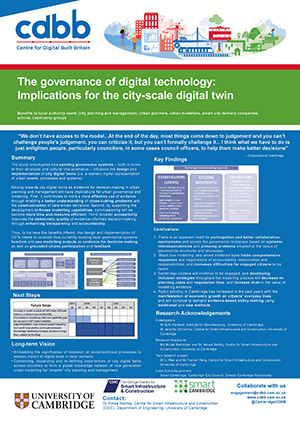The local governance of digital technology – Implications for the city-scale digital twin. ECR project by Dr Timea Nochta, IfM, University of Cambridge
Dr Timea Nochta, University of Cambridge
'The local governance of digital technology – implications for the cityscale digital twin'
This study investigates how existing governance systems – both in terms of their structural and cultural characteristics – influence the conceptualisation, form, content and implementation of a city’s “digital twin” (i.e. a digital representation of its assets, processes or systems in the built or natural environment that supports improved decision-making). Developing a knowledge base on the urban governance of city-level digital twins is essential to drive organisational change towards locally appropriate governance structures and mechanisms to maximise benefits and contain associated risks of emerging hybrid decision-making processes in the context of city planning, management and operation. This involves addressing issues related to control, responsibility, accountability and liability, as well as their context-dependence.
The project consists of the following three work packages:
- State-of-the-art review of the literature on the governance of digital technology and its relevance to decision-making in city planning, management and operation.
- Case study of the development of a digital twin prototype for the Cambridge area, aimed at answering the first research question: How does the existing local governance (structure and culture) of data and digital technology influence the conceptualisation, form, content and the options for implementation of the digital twin(s) of a city?
- A comparative analysis via contrasting the results of the Cambridge case study with the development of other city digital twin prototypes to address the second research question: What contextual factors (characteristics) matter in the governance of the digital twin of a city?
Understanding context-boundedness and generalisability around characteristics of urban governance relevant to the conceptualisation, form, content and implementation of city-level digital twins is necessary to successfully transfer knowledge and best-practices among different cities within the UK and beyond.
Contact: Dr Timea Nochta

